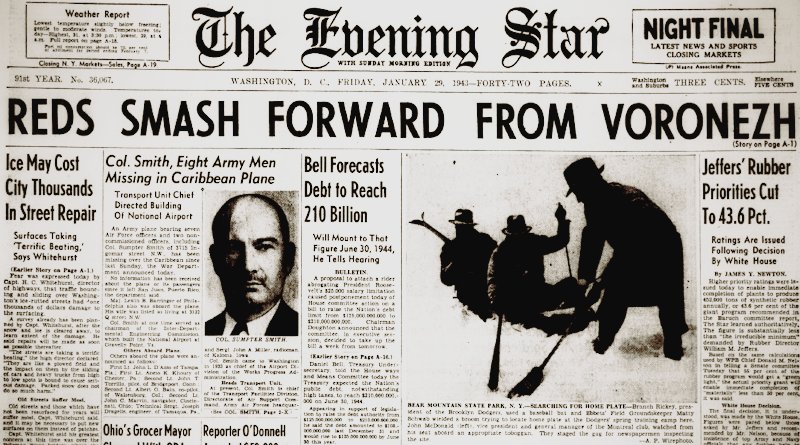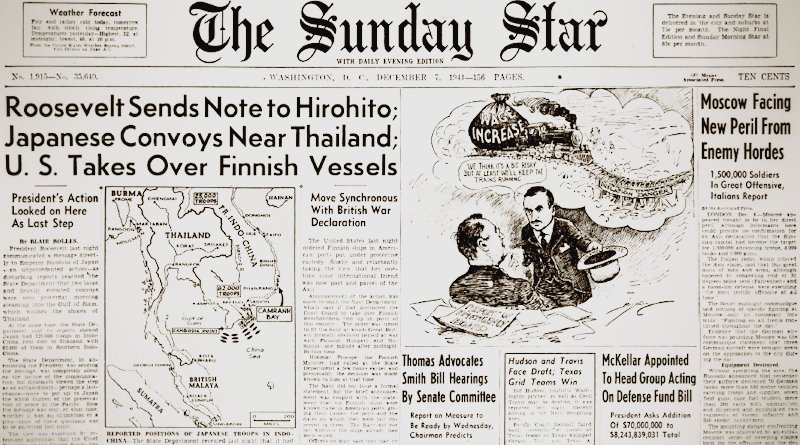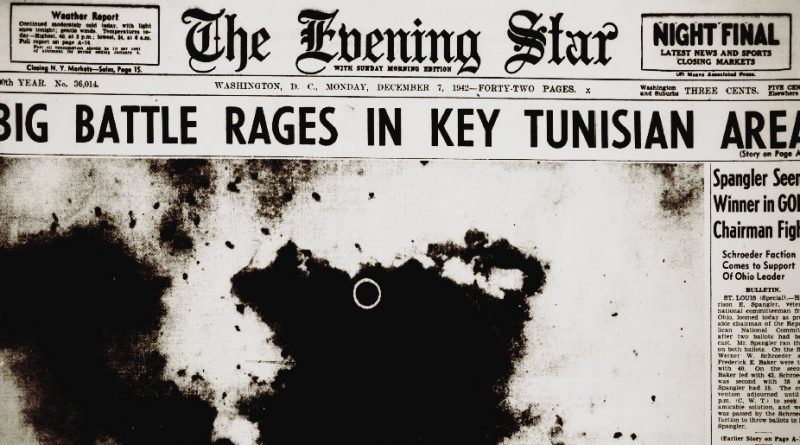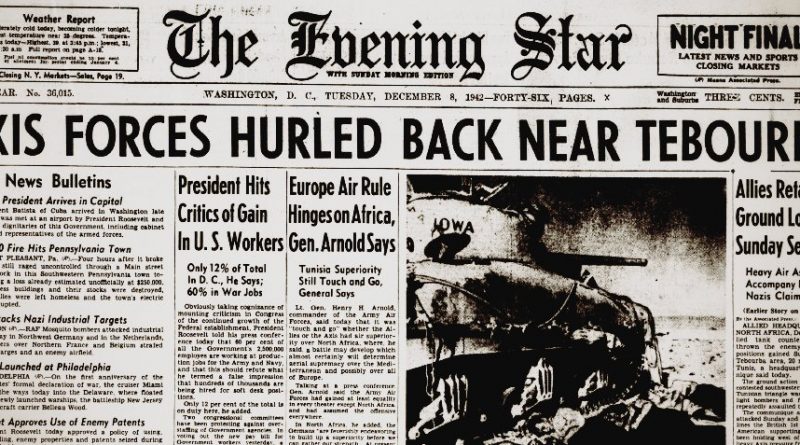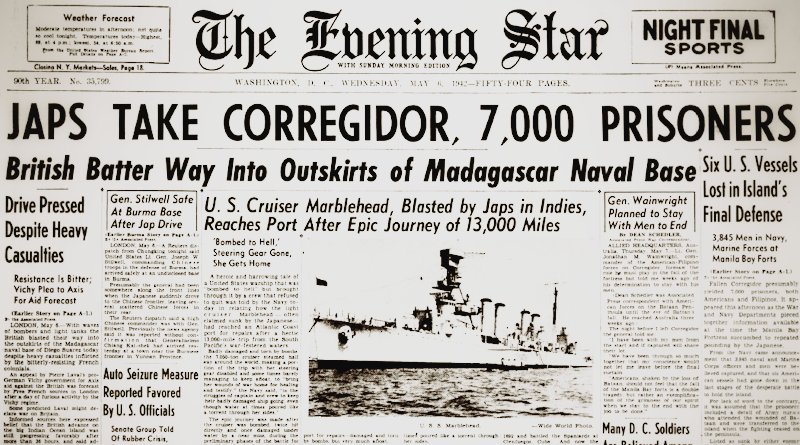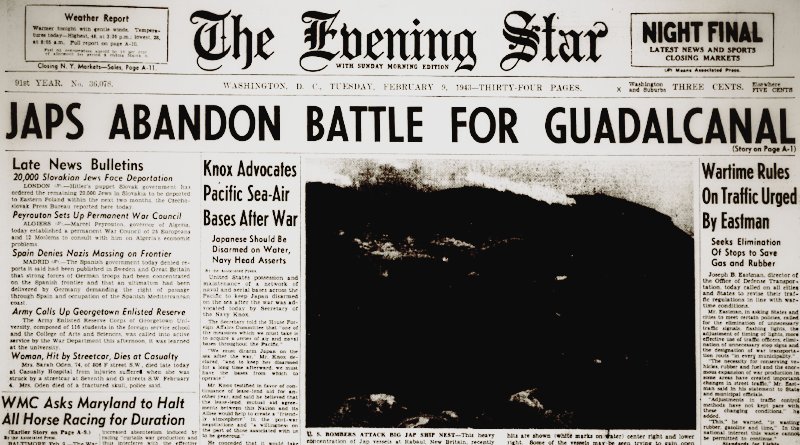World War II Chronicle: January 29, 1943
Click here for TODAY’S NEWSPAPER
The front page reports that during the Naval Battle of Casablanca, the American battleship USS Massachusetts fired several salvos at the French battleship Jean Bart from the incredible range of 26 miles and scored several direct hits. Aircraft from USS Ranger also hammered the ship with 500-lb. and 1,000-lb. bombs, but despite all the hits, Jean Bart kept up the fight all day long. The ship sustained less than 50 men killed or wounded..
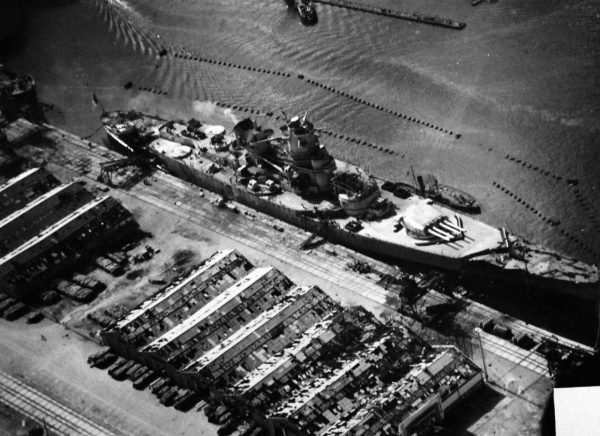
The secret high-ranking officer we almost lost during the flight to the Casablanca Conference is Maj. Gen. Ira Eaker, commanding general of the Eighth Air Force (see page two). The B-17 pilot is Capt. Clifton F. Pyle, who flies for Col. Curtis LeMay’s 305th Bomb Group… George Fielding Eliot column on page 12… Sports on page 19…
Roving Reporter by Ernie Pyle
A FORWARD AIRDROME IN FRENCH NORTH AFRICA — This is a continuation of the story of nine American boys who got lost, accidentally ran into German fighter planes, and had to jump from their Fortress on their very first day in the war zone.
The bombardier, Lieut. Victor Coveno, of Cleveland, is the gay one of the outfit. It was all marvelous to him. He recalls all the funny little things that happened. For instance, about the German fighters who surprised them, Coveno says:
“You know what I said? I said ‘Let’s shoot them tin cans down.”
But the tin cans kept out of Coveno’s range.
Finally, late that night, they ran out of gas and had to jump. They had a box of vitamin pills aboard, and they each ate a handful of pills just before jumping. Coveno grabbed a .45 automatic in one hand and a flashlight in the other, and jumped that way, carrying them all the way down.
One of the sergeants tucked an orange under his arm. And then while plunging through space he had to reach up and get the orange in his hand so he could free that arm for pulling the ripcord. He saved the orange then, but later he let it drop somewhere. He’s still cussing about it.
Coveno sang all the way down. He doesn’t remember what he sang, but he just sang because he was so damned happy about that parachute. However, it oscillated so badly he got seasick.
Parachutes in the war zone are packed with chocolate rations, and the boys stuffed a few additional rations in their pockets before jumping.
On the ground, Lieutenant Devers ordered them to cut their rations to half portions, in case they should be in the desert a long time. As it turned out, their parachute rations were still untouched when they finally reached an American airdrome. They ate goat meat all the time with the Arabs. They don’t care much for goat meat.
Arabs are naturally wizards at finding water holes, and the boys would fill their canteens at these. They always remembered to put in purifying pills, which we all carry.
They slept in their parachutes all five of their nights in the desert. They didn’t sleep much, for it was too cold. Devers appointed guards each night, for they still weren’t sure where they were.
During the day, when riding razorback camels in utmost agony, they all sang that Bing Crosby-Bob Hope song, “The Road to Morocco.” They were a long way from Morocco, but they felt that the song sort of fitted into their background.
The old Arab who first picked them up was a spectacular character, a true nomad moving from day to day with his family and his herd of goats. He was 80 years old, had only one eye and no teeth.
They talked to him in sign language. He told them he had heard their plane the night before.
The boys tried to give him money when they parted. He wouldn’t take it, but he did accept some knives. The boys forgot to find out his name, but the Arab will be taken care of anyhow when the French find him, for the American Army will reward him.
Coveno says: “Boy, I’ve seen one beautiful Arab girl. She’s this old fellow’s granddaughter, and she’s really beautiful.”
But the Lieutenant heard how the Arabs feel about their women, so he didn’t make eyes at her.
Lieutenant Watt was the only one in the bunch who saved his ripcord. Several of the crew arrived carrying specimens of a peculiar rock, picked up from the sands. It’s called desert rose. It’s a precious souvenir they’ll always keep.
All of them lost everything they had on the plane. When they arrived they naively said: “We want to go to the Quartermaster in the morning and get some new outfits.”
Everybody laughed loudly. You don’t get new outfits here. You wear just what you’ve got on, and keep on wearing it for months and months.
These boys feel miserable about bungling their trip and losing a brand-new ship. They are humble about it. And they are almost worshipful in the presence of the veterans here who have seen so much action. But they will get a new ship, and in a few months they will be able to talk like veterans to other new arrivals.
Evening star. (Washington, D.C.), 29 January 1943. Chronicling America: Historic American Newspapers. Lib. of Congress.
https://chroniclingamerica.loc.gov/lccn/sn83045462/1943-01-29/ed-1/
